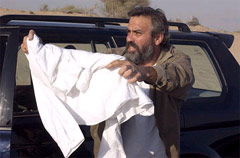
| HOME |
| NERVE |
| REVIEWS |
| ARCHIVE |
| EVENTS |
| LINKS |
| ABOUT US |
| CONTRIBUTORS |
| BACK ISSUES |
| CONTACT US |
 Syriana (15)
Syriana (15)
Written and Directed by Stephen Gaghan
Suggested by Robert Baer's 'See No Evil: The True Story of a Ground Soldier
in the CIA's War on Terrorism'
Screening at FACT from 3rd March 2006
Reviewed by Adam Ford
'Syriana' is apparently a code name given to the United States government's vision of a the Middle East at the end of the 'war on terrorism'. Basically, everything else can go to hell as long as US companies have all the oil. Robert Baer - writer of the book which inspired the film - should know, because he is a former CIA case officer.
Writer and Director Stephen Gaghan gives us a progress report on the grand chess game, taking Baer's 2002 book right up to date. In doing so, he joins the dots like TV news never will, drawing a brutally violent picture of an area that is becoming ever more important for those who wish to rule the world, and allowing his characters to reveal exactly why in a genuine and uncontrived way.
The plot is fiendishly complicated, but then what else would anyone expect? There are several interconnected stories. In the US, oil firm Connex is about to merge with the smaller Killen - who have just got their hands on the rights to oilfields in Kazakhstan. To maintain a veneer of accountability, the US Justice Department ropes in lawyer Bennett Holiday (Jeffrey Wright) to find a couple of sacrificial lambs within the company. Meanwhile, a former CIA agent turned Killen boss (Christopher Plummer) is busy working on the 'Committee to Liberate Iran'. Now why would an oilman possibly want Iran to go the same way as Iraq I don't wonder.
In the Middle East, there is a struggle for succession in a small unnamed emirate. The emir's eldest son (Alexander Siddig) wants to award a contract to China, so the US attempts an assassination. CIA case officer Bob Barnes (George Clooney) is dispatched to Lebanon to hatch the plot.
Almost all of the characters exist in a bubble of obscene opulence, whereas the main working class character (played by Mazhar Munir) is made redundant following the merger and forced to join an Islamic school or face deportation and destitution. It is there that his righteous anger against his treatment is sharpened into Islamicist hatred, and he becomes a suicide bomber.
It is Munir's character that is perhaps the most important in the entire film. An almost insignificant pawn, he is treated with stunning but fantastic compassion by Gaghan. Far from being demonised, he is presented as another victim of horrible circumstances, and the viewer's own rage is directed against both the oil industry and capitalism itself. As Gaghan commented in an interview, "...there are no good guys or bad guys. The system itself is what you’re indicting.”
If there are flaws in one of the most significant films to come out the US in a generation, they are imposed by the sheer pressure of keeping the film short enough to watch without losing the will to live. There is so much horror to convey, and Gaghan squeezes it all in just a little too tight. Indeed, Matt Damon's TV analyst character seems to exist just to help the viewer catch up by offering the odd line to camera. As a result, his scenes seem stilted and artificial.
Syriana offers no way out, and the viewer is left feeling exhausted, overwhelmed, and deeply pessimistic about the future. It was about an hour before I remembered the possibility of establishing alternatives to fossil fuels and (more importantly) the class of parasitical gangsters who trade in misery and will stop at nothing to make a killing.
Printer friendly page